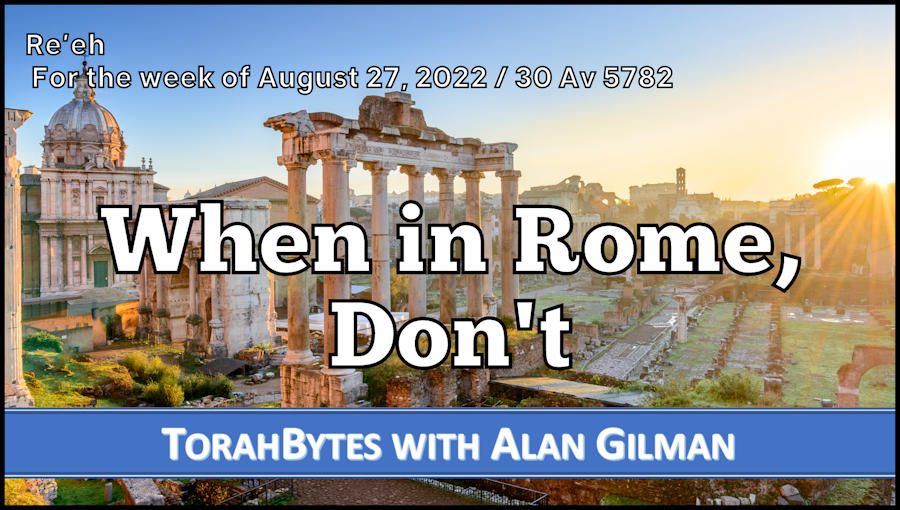For the week of September 3, 2022 / 7 Elul 5782

Shoftim
Torah: D’varim/Deuteronomy 16:18 – 21:9
Haftarah: Isaiah 51:12 – 52:12
Download Audio [Right click link to download]
You shall not plant any tree as an Asherah beside the altar of the LORD your God that you shall make. And you shall not set up a pillar, which the LORD your God hates. (D’varim/Deuteronomy 16:21-22)
Over the past year, for my own personal Bible reading, I have been slowly working through the books of 1 & 2 Kings – not the most encouraging section of Scripture. It’s not all negative, of course. There’s Solomon’s rise to power and how God used him to establish Israel’s golden age. But it’s Solomon’s greatness and divinely inspired wisdom that make his slide into idolatry that much more distressing. Israel never recovers from this. The result of Solomon’s unfaithfulness to God results in the dividing of the Kingdom into north and south. The north is known as Israel or Ephraim, the south as Judah.
There are also the stories of the prophets Elijah and Elisha, but their brightness shines against an intensely dark background. Apart from a few good kings, the vast majority are evil. And when the better kings reign, it doesn’t take long before the nation plunges back into false religion and immorality.
One of the greatest, if not the greatest, times of reform occurs near the end of 2 Kings, during the reign of Josiah (see 2 Kings 22-23). The north had already been conquered by the Assyrians about a hundred years earlier. For the south, it’s beyond the point of no return. The level of evil under the reign of Josiah’s father, Manasseh, was the last straw as far as God was concerned. Judgement for the south was coming. It was only a matter of time.
Yet, this didn’t prevent Josiah from doing what was right. Unlike some of the earlier good kings, his reforms were thorough. Several of the other good kings tolerated various evil activities, but not Josiah. In my reading, I was overwhelmed by the vast number of positive changes he implemented as this reflected how saturated with idolatrous customs Judah was.
That which started Josiah’s reforms was the discovery of the “sefer Torah” (English: the book of the Law) during the Temple renovations he ordered. Josiah was devastated to learn God’s perspective on the nation’s behavior and took action. But once Josiah died, his son led the nation right back into evil and the nation began to crumble until it collapsed.
I often wonder about the lost Torah. How long was it lost? God had commanded that it should be read to the nation every seven years (see D’varim/Deuteronomy 31:10). Kings were to produce their own copy of the Torah and read it all their days (see D’varim/Deuteronomy 17:18-20). Were these ever done? We don’t know. It is reasonable to think that the Torah had become forgotten very early on. Perhaps there were times when it was more central than other times.
However central Torah was throughout Israel’s history, it didn’t change the fact that the people knew better. The fact that there were kings who basically did right, though few and far between, demonstrates that the knowledge of the true God and his ways were known. Known, but ignored. Just like today.
Just like today except that the Torah isn’t lost. Not only is it accessible as never before, be it in printed or digital form, it is ignored. The general ignorance of Scripture is no excuse even if it isn’t read. The evidence of what constitutes good and bad is on display for all to see. That obedience to God leads to life, while disobedience leads to death appears to make no difference whatsoever when we are consumed with ourselves or don’t care about the long-term effect of our misguided lives.
We live amidst a great fog of meaninglessness and self-absorption. For many, pursuing godliness feels futile. The world seems to be going down the drain at lightening speed. Why even try?
Ask King Josiah. He knew that doing the right thing was the right thing to do. Serving God faithfully in his generation whatever would happen down the road was worth it. Frankly, I don’t think we live in a day like Josiah’s. I don’t think we are going down the drain. It just feels like that sometimes. God has great things in store for those who are willing to trust him. Let’s not wait until our circumstances changes before we do.
Scriptures taken from the English Standard Version

